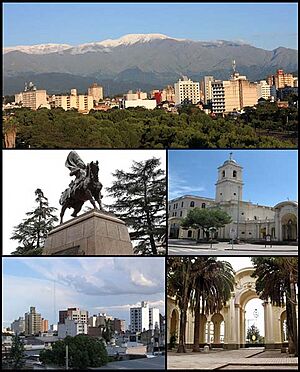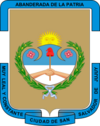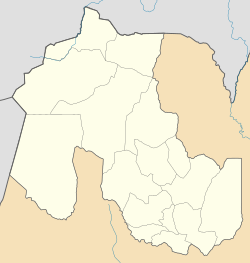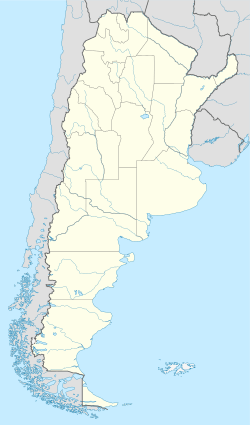San Salvador de Jujuy facts for kids
Quick facts for kids
San Salvador de Jujuy
|
||
|---|---|---|

(From top to bottom; from left to right) View of the city; Monument to Belgrano; Cathedral of St. Francis; Downtown and Patio of the Cathedral Church
|
||
|
||
| Country | ||
| Province | ||
| Department | Doctor Manuel Belgrano | |
| Founded | April 19, 1593 | |
| Area | ||
| • City | 19 km2 (7 sq mi) | |
| Elevation | 1,259 m (4,131 ft) | |
| Population
(2010)
|
||
| • Urban | 257,970 | |
| Demonym(s) | Jujeño | |
| Time zone | UTC−3 (ART) | |
| CPA base |
Y4600
|
|
| Dialing code | +54 388 | |
| Website | Official website: http://www.sansalvadordejujuy.gob.ar/ | |
San Salvador de Jujuy is a big city in Argentina. It is the capital and largest city of Jujuy Province. People often call it Jujuy or San Salvador. The city is located in the northwest part of Argentina. It sits near the southern end of the Humahuaca Canyon. Here, green hills meet flat lands.
In 2001, about 237,751 people lived in the city. If you include the areas around it, the population is about 300,000. The current mayor of the city is Raúl Jorge.
Contents
About San Salvador de Jujuy
San Salvador de Jujuy is on National Route 9. This road connects it to other important places. For example, it is 289 km (180 mi) from La Quiaca. It is also 120 km (75 mi) from Salta. The city is 1,525 km (948 mi) away from Buenos Aires.
Fun Places to Visit Nearby
There are many cool places to visit close to Jujuy.
- Tilcara is 84 km (52 mi) away.
- Humahuaca is 126 km (78 mi) away.
- The Calilegua National Park is 111 km (69 mi) away.
City Location and Weather
Jujuy is close to the Andes mountains. It is where the Xibi Xibi River and the Río Grande de Jujuy meet. The city is 1,238 meters (4,062 feet) above sea level. The weather is wet in the summer. It is dry and cold in the winter. Temperatures can change a lot between day and night.
City's Importance
San Salvador de Jujuy is the center for the province's government. It is also a main place for money and culture. Many offices for businesses are here. These businesses include getting oil and making sugar. They also grow tobacco and make steel. Farmers also grow fruits and vegetables for people in the city.
Historic City Center
The city has an old colonial center. You can see the Cabildo, which is a historic building. There is also the beautiful Cathedral of St. Francis. The city is also famous for its colorful Andean carnivals.
Getting to Jujuy
The Gobernador Horacio Guzmán International Airport is 33 km (21 mi) southeast of the city. It is in a place called Ciudad Perico. You can take regular flights from this airport to Buenos Aires.
History of San Salvador de Jujuy
The city of San Salvador de Jujuy was founded on April 19, 1593. Its first name was San Salvador de Velazco en el Valle de Jujuy. Francisco de Argañarás y Murguía founded it. Before this, people tried to start a city here in 1565 and 1592.
Early Development
The city grew because it was an important stop. It was on the trade route for mules. This route connected San Miguel de Tucumán to the silver mines in Potosí, Bolivia.
After Independence
Jujuy was very important during the time of Spanish rule. But after Argentina became independent in 1816, it became a smaller provincial capital. In 1834, Jujuy Province became separate from Salta Province. San Salvador de Jujuy became its capital.
Growth and Modern Times
In 1863, a big earthquake hit the town. It took many years for the city to recover. Jujuy started to grow again when the Northern Central Railway arrived in 1900. The first college, the Economic Sciences Institute, opened in 1959. It became part of the new National University of Jujuy in 1973.
Climate in San Salvador de Jujuy
Jujuy has a humid subtropical climate. This means it has warm, wet summers and dry, cool winters. The city is high up, which affects its weather.
Seasonal Weather
- Summers: Days are warm, around 28°C (82°F). Nights are cooler, around 16°C (61°F). There are often thunderstorms.
- Rest of the year: It is usually sunny. Days are about 24°C (75°F) and nights are 11°C (52°F).
- Winters: Winters are dry and crisp. Days are around 19°C (66°F) and nights are cold, about 6°C (43°F).
- Springs: Springs are sunny. Days are around 26°C (79°F) and nights are cool, about 11°C (52°F).
Temperature Extremes
Sometimes, temperatures can reach 35°C (95°F) during heat waves. But this does not happen often. Nights always get much cooler. The lowest temperature ever recorded was -6.9°C (19.6°F) in August 1978. The highest was 42.4°C (108.3°F) in October 2014.
Rainfall
Jujuy gets about 800 mm (31 inches) of rain each year. Most of this rain falls as thunderstorms during the warmest months.
| Climate data for San Salvador de Jujuy (Gobernador Horacio Guzmán International Airport) 1991–2020, extremes 1968–present | |||||||||||||
|---|---|---|---|---|---|---|---|---|---|---|---|---|---|
| Month | Jan | Feb | Mar | Apr | May | Jun | Jul | Aug | Sep | Oct | Nov | Dec | Year |
| Record high °C (°F) | 40.2 (104.4) |
38.4 (101.1) |
39.8 (103.6) |
34.5 (94.1) |
33.9 (93.0) |
34.1 (93.4) |
39.9 (103.8) |
38.0 (100.4) |
41.3 (106.3) |
42.4 (108.3) |
41.7 (107.1) |
42.0 (107.6) |
42.4 (108.3) |
| Mean daily maximum °C (°F) | 30.3 (86.5) |
28.8 (83.8) |
27.1 (80.8) |
24.3 (75.7) |
21.3 (70.3) |
19.9 (67.8) |
20.1 (68.2) |
23.6 (74.5) |
26.4 (79.5) |
29.0 (84.2) |
30.0 (86.0) |
30.7 (87.3) |
26.0 (78.8) |
| Daily mean °C (°F) | 23.8 (74.8) |
22.7 (72.9) |
21.3 (70.3) |
18.5 (65.3) |
15.1 (59.2) |
12.5 (54.5) |
11.9 (53.4) |
15.1 (59.2) |
18.4 (65.1) |
21.9 (71.4) |
23.1 (73.6) |
24.0 (75.2) |
19.0 (66.2) |
| Mean daily minimum °C (°F) | 18.5 (65.3) |
17.9 (64.2) |
17.0 (62.6) |
14.1 (57.4) |
10.4 (50.7) |
7.3 (45.1) |
6.0 (42.8) |
8.2 (46.8) |
11.0 (51.8) |
15.1 (59.2) |
16.7 (62.1) |
18.1 (64.6) |
13.4 (56.1) |
| Record low °C (°F) | 9.4 (48.9) |
7.5 (45.5) |
7.7 (45.9) |
1.5 (34.7) |
−1.9 (28.6) |
−6.0 (21.2) |
−6.0 (21.2) |
−6.9 (19.6) |
−1.8 (28.8) |
1.8 (35.2) |
4.2 (39.6) |
8.5 (47.3) |
−6.9 (19.6) |
| Average precipitation mm (inches) | 147.6 (5.81) |
154.0 (6.06) |
131.8 (5.19) |
51.7 (2.04) |
13.6 (0.54) |
4.3 (0.17) |
2.8 (0.11) |
2.1 (0.08) |
5.1 (0.20) |
28.8 (1.13) |
56.1 (2.21) |
122.5 (4.82) |
720.4 (28.36) |
| Average precipitation days (≥ 0.1 mm) | 13.4 | 12.6 | 13.5 | 9.0 | 4.2 | 2.6 | 2.0 | 1.0 | 1.8 | 4.9 | 7.4 | 11.5 | 83.9 |
| Average snowy days | 0.0 | 0.0 | 0.0 | 0.0 | 0.0 | 0.1 | 0.2 | 0.0 | 0.0 | 0.0 | 0.0 | 0.0 | 0.2 |
| Average relative humidity (%) | 73.2 | 77.5 | 81.1 | 81.5 | 79.3 | 75.9 | 67.1 | 55.7 | 50.0 | 55.7 | 60.7 | 67.3 | 68.8 |
| Mean monthly sunshine hours | 213.9 | 175.2 | 167.4 | 150.0 | 158.1 | 165.0 | 201.5 | 220.1 | 210.0 | 210.8 | 213.0 | 213.9 | 2,298.9 |
| Mean daily sunshine hours | 6.9 | 6.2 | 5.4 | 5.0 | 5.1 | 5.5 | 6.5 | 7.1 | 7.0 | 6.8 | 7.1 | 6.9 | 6.3 |
| Percent possible sunshine | 55 | 53 | 46 | 49 | 57 | 47 | 62 | 62 | 57 | 52 | 51 | 54 | 54 |
| Source 1: Servicio Meteorológico Nacional | |||||||||||||
| Source 2: UNLP (percent sun only 1971–1980) | |||||||||||||
| Climate data for San Salvador de Jujuy (National University of Jujuy) 1991–2020 normals, extremes 1987–present | |||||||||||||
|---|---|---|---|---|---|---|---|---|---|---|---|---|---|
| Month | Jan | Feb | Mar | Apr | May | Jun | Jul | Aug | Sep | Oct | Nov | Dec | Year |
| Record high °C (°F) | 37.4 (99.3) |
35.0 (95.0) |
34.0 (93.2) |
31.5 (88.7) |
32.2 (90.0) |
35.2 (95.4) |
36.2 (97.2) |
37.6 (99.7) |
38.0 (100.4) |
39.8 (103.6) |
40.0 (104.0) |
38.1 (100.6) |
40.0 (104.0) |
| Mean daily maximum °C (°F) | 27.3 (81.1) |
26.2 (79.2) |
24.8 (76.6) |
22.4 (72.3) |
19.6 (67.3) |
18.6 (65.5) |
18.6 (65.5) |
21.7 (71.1) |
24.0 (75.2) |
26.4 (79.5) |
27.1 (80.8) |
27.7 (81.9) |
23.7 (74.7) |
| Daily mean °C (°F) | 21.1 (70.0) |
20.2 (68.4) |
19.1 (66.4) |
16.6 (61.9) |
13.4 (56.1) |
11.1 (52.0) |
10.2 (50.4) |
13.0 (55.4) |
15.7 (60.3) |
19.0 (66.2) |
20.2 (68.4) |
21.3 (70.3) |
16.7 (62.1) |
| Mean daily minimum °C (°F) | 16.7 (62.1) |
16.2 (61.2) |
15.5 (59.9) |
12.7 (54.9) |
9.1 (48.4) |
5.9 (42.6) |
4.5 (40.1) |
6.4 (43.5) |
9.1 (48.4) |
12.9 (55.2) |
14.6 (58.3) |
16.2 (61.2) |
11.7 (53.1) |
| Record low °C (°F) | 9.1 (48.4) |
5.7 (42.3) |
6.9 (44.4) |
0.9 (33.6) |
−2.6 (27.3) |
−4.0 (24.8) |
−6.4 (20.5) |
−4.8 (23.4) |
−3.4 (25.9) |
1.7 (35.1) |
2.9 (37.2) |
7.4 (45.3) |
−6.4 (20.5) |
| Average precipitation mm (inches) | 191.5 (7.54) |
188.0 (7.40) |
166.5 (6.56) |
62.0 (2.44) |
20.9 (0.82) |
9.5 (0.37) |
7.1 (0.28) |
5.9 (0.23) |
9.4 (0.37) |
40.8 (1.61) |
97.5 (3.84) |
152.1 (5.99) |
951.1 (37.44) |
| Average precipitation days (≥ 0.1 mm) | 16.7 | 15.7 | 15.4 | 10.1 | 6.5 | 4.3 | 3.7 | 2.9 | 3.7 | 7.6 | 10.7 | 14.5 | 111.8 |
| Average snowy days | 0.0 | 0.0 | 0.0 | 0.0 | 0.1 | 0.1 | 0.3 | 0.2 | 0.1 | 0.0 | 0.0 | 0.0 | 0.7 |
| Average relative humidity (%) | 80.7 | 83.7 | 84.9 | 84.7 | 83.0 | 79.3 | 74.1 | 65.3 | 62.6 | 67.0 | 71.1 | 77.0 | 76.1 |
| Source: Servicio Meteorológico Nacional | |||||||||||||
Notable People from Jujuy
- Iván Almasana (born 1993), a professional football player from Argentina.
- Ana Pelegrín (1938–2008), a famous researcher, writer, and teacher.
Images for kids
-
Monument to Manuel Belgrano
See also
 In Spanish: San Salvador de Jujuy para niños
In Spanish: San Salvador de Jujuy para niños
 | George Robert Carruthers |
 | Patricia Bath |
 | Jan Ernst Matzeliger |
 | Alexander Miles |








